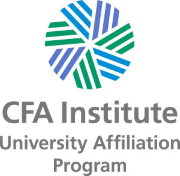Financial Statement Analysis
Course Name: Financial Statement Analysis
Teacher: Seraina Anagnostopoulou
School: Finance and Statistics
Department: Banking and Financial Management
Level: Undergraduate
Course ID: — Semester: 3rd
Course Type: Core Course
Prerequisites: –
Teaching and Exams Language: Greek
Course Availability to Erasmus Students: No
Course webpage: –
Specific Teaching Activities |
Weekly Teaching Hours |
Credit Units |
Lectures |
4 |
7.5 |
Course Content
– Financial statement analysis overview: Business analysis, efficiently reporting for business transactions within financial statements, tools for analysis, basic valuation models, market efficiency.
– Financial reporting environment, accrual accounting and its role and effect on financial statement analysis.
– Accounting profit and economic profit, fair value accounting, introduction to accounting analysis and earnings quality, relevance of financial reporting information.
– Analysis of financing activities, debt financing, off balance sheet financing, contingent events, shareholders’ equity analysis, analysing current and non-current assets.
– Measurement and classification of accounting income, transitory profit items.
– Preparation and analysis of the statement of cash flows, using the cash flow statement for financial statement analysis.
– Problems and challenges when using earnings before interest, tax, depreciation and amortisation (EBITDA)
– Return on Investment (ROI), the components of ROI, profitability analysis using financial ratios, Return on Assets (ROA), Return on Equity (ROE) – detailed presentation, ratio decomposition and analysis.
– Introduction to prospective analysis and preparation of pro forma financial statements.
– Credit analysis, liquidity and working capital, financial ratios for analyzing liquidity, analyzing inventory, accounts receivable, and accounts payable using ratios.
– Solvency analysis, basic concepts and ratios to analyse solvency, interest coverage, earnings quality.
Teaching Results
The purpose of this module is to cover the fundamental principles and concepts of financial statement analysis, starting from the good understanding of the business environment and how this environment affects the analysis, along with how financial statement analysis associates with equity market valuation.
The module further covers the topic of accounting analysis and assessment of earnings quality, along with the principles of preparation of pro forma financial statements, and finally credit analysis, and profitability and solvency analysis.
There is further covered the preparation and analysis of the statement of cash flows, as a fundamental step in financial statement analysis. Concepts are presented through the systematic use of examples and case studies. Overall, the module thoroughly presents liquidity, solvency and profitability analysis through the use of financial ratios.
Module material is developed in accordance with International Financial Reporting Standards – IFRS).
At the end of the semester the students should be able to:
– Perform liquidity, solvency and profitability analysis for a firm though the use of relevant scientific concepts and tools, and extensive use of financial ratios.
– Perform credit analysis and understand the basic steps of accounting analysis though the use of relevant tools.
– Connect and understand the effect of the macroeconomic and business environment of a firm with the conduction on financial statement analysis.
– Prepare a cash flow statement for uncomplicated cases of corporate financial statements, and critically analyse these statements.
– Understand the discretion available for managers regarding the recognition of several accounting events, and how this discretion affects earnings quality and financial statement analysis.
– Understand the basic challenges and difficulties that exist in financial statement analysis.
Skills
– Search, analysis and synthesis of financial data and relevant information.
– Critical thinking on scientific topics related to the content of the module relevant decision-making.
– Development of analytical and synthetic thinking, ability for autonomous work.
– Working in an international environment, understanding the challenges of applying accounting rules in an international environment.
– Working in a multidisciplinary environment, collaborating with scholars of closely related scientific fields.
– Production of creative and deductive thinking and critical reasoning.
Teaching and Learning Methods - Evaluation
Lecture: Ιn Class
Use of Information and Communication Technologies: Use of PowerPoint, e learning platform Eclass
Teaching Analysis:
Activity |
Semester Workload |
Lectures |
52 |
Study |
135.5 |
Total |
187.5 |
Student Evaluation:
Compulsory written exam at the end of the semester. This involves providing answers to exercises, problems and case studies, using numerical data, and a critical evaluation and discussion of the results, and also possible answers to multiple choice questions and theoretical questions.
Recommended Bibliography
– Module slides and exercises/cases studies covered in class
– Subramanyam, K.R. (2016). Financial Statement Analysis, 11E, McGraw-Hill, Greek edition (translated) Broken Hill Publishers.
– Rice, A. (2016). Accounts Demystified– edited by Karagiorgos, Th., and Sykianakis, N., Rosilli Editions (for Greek translation).
Relevant literature:
-Alexander/Britton/Jorissen/Hoogendoorn/van Mourik (2017), International Financial Reporting and Analysis, 7th Edition, Cengage Learning.
-Palepu, C.G., Healy, P.M., and Peek, E. (2019). Business Analysis and Valuation – IFRS Edition, 5th Edition, Cengage Learning.
– Stolowy/Ding (2015), Financial Accounting and Reporting – A global perspective, 5th Edition, Cengage Learning.




